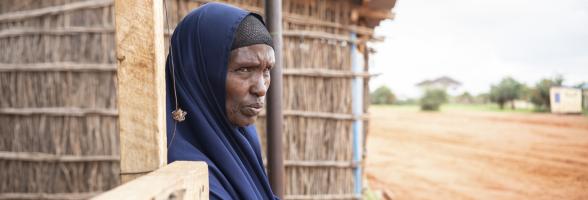As the world marks World Refugee Day on 20 June 2023, the East Africa and the Great Lakes region is home to over 5.4 million refugees, most of them in protracted situations with limited opportunities or access to solutions that would help them rebuild their lives. This refugee crisis is complex and dynamic, affecting all countries of the region, with movements in all directions: refugees from South Sudan, the Democratic Republic of Congo, Sudan, Somalia, Eritrea and Ethiopia are hosted primarily in Uganda, Sudan, Ethiopia, Kenya, and South Sudan.
The crisis that has been unfolding for the past two months in Sudan is a telling example of the complexity, layering and interconnectedness of the displacement situations in the region. Prior to the eruption of the Sudan conflict, the country already hosted over 1.1 million refugees, making it one of the largest refugee-hosting countries in the world, and the second largest in Africa.
Most of those who had sought sanctuary in Sudan had fled the South Sudanese civil war in 2013 and settled in urban areas, out-of-camp settlements and within host communities. Ten years later, as the conflict in Sudan between the Sudanese Armed Forces (SAF) and Rapid Support Forces (RSF) escalated with devastating consequences on civilians, despite several ceasefires, refugees found themselves in a similar situation to the one they previously had to escape. Violence, insecurity and lack of access to essential supplies, healthcare, water and electricity made the situation untenable, and close to 103,000 South Sudanese refugees felt that they were left with no choice but to return to their country of origin, taking their chance to escape during a lull in fighting.
Yet, conditions in South Sudan are far from conducive to allow durable solutions, and the response is severely underfunded. The new arrivals add to the 9.4 million people already estimated to be in need of humanitarian assistance in South Sudan – 76 percent of the population – including 2.2 million internally displaced people. Many are stranded in overcrowded reception centres in Renk, where humanitarian agencies are racing to scale up emergency assistance. Without adequate protection, emergency assistance, peace-building efforts and work to pave the way for durable solutions, the returns could further worsen the humanitarian situation and social cohesion in South Sudan, leading to further conflict and displacement.
While the forced returns to South Sudan are of particular concern, the Sudan crisis has repercussions on the humanitarian situation and stability of the entire region, as people also continue to search for safety across the borders into Egypt, Chad, Central African Republic, and Ethiopia – so far over 356,000 Sudanese and other nationals have crossed into these four countries, over 90 percent of them to Egypt and Chad. Most of these countries are facing crises of their own, including conflict and extreme weather patterns, also leading to forced displacement.
The region’s displacement situation remains of critical concern and, with the Global Refugee Forum set to take place at the end of the year, the international community must amplify their efforts to meet their commitments under the Global Refugee Compact. The current funding of the different Humanitarian and Refugee Response Plans – including for Sudan – neither reflect nor address the severity of the situation.
We are still far from being sufficiently resourced to scale up and meet the immediate needs, or to integrate vital resilience and durable solutions initiatives, for the long-term or newly displaced and their host communities.
As humanitarian needs continue to grow in 2023, we, the undersigned organisations, call on global donors to decisively:
- Fully fund Humanitarian and Refugee Response Plans without delay and across all sectors and areas. With specific regards to the Sudan crisis, reprogramming or pivoting of previously committed funding is grossly insufficient to address the ever-increasing needs both in Sudan and the neighbouring countries.
- Urgently convene and engage all key stakeholders – including relevant authorities, as well as local, national and international NGOs – to better coordinate different funding streams. Together, we must find ways to ensure that predictable, multi-year nexus funding can complement life-saving assistance, reinforce social cohesion and build resilience to future shocks.
We also call on refugee-hosting countries to:
- Maintain open borders and asylum space for people fleeing conflict in Sudan, enabling them to seek safety and access humanitarian assistance.
- Enable the inclusion and self-reliance of refugees by ensuring that they can seek employment, enrol in schools and access services such as health care and adequate housing. Refugees have the right and need the opportunity to learn and progress at school, earn a living and live a healthy life.
- Facilitate refugees’ access to durable solutions, including local integration.
Fatuma Noor | Media and Communication Advisor
Oxfam in Africa
fatuma.noor@oxfam.org | Tel : +254 723 944 682

